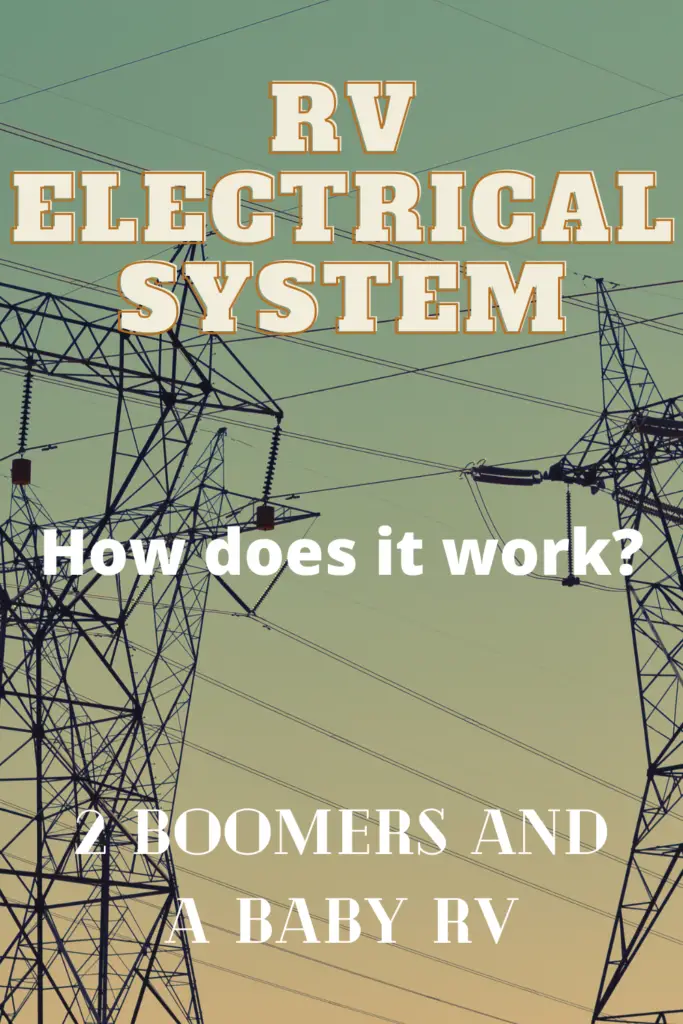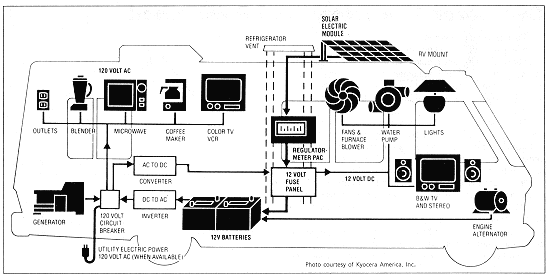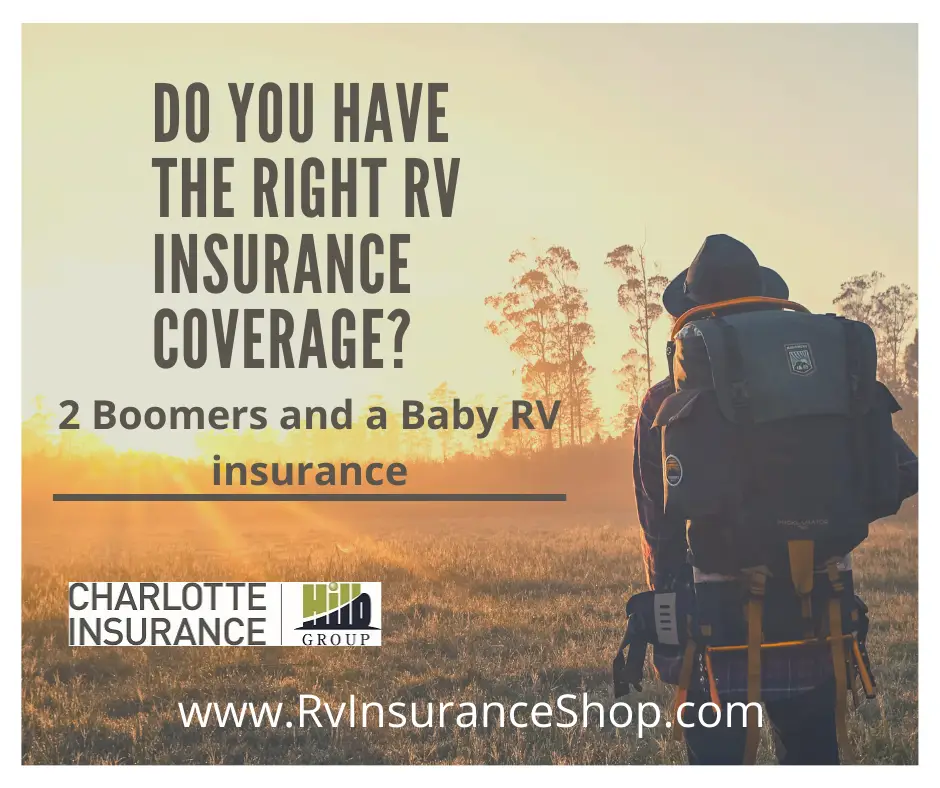Your RV likely uses both AC (alternating current) and DC (direct current) to run different devices. If you are plugged in at the campground, it brings in 120V and then splits it up as needed. One part is 120V and another part is converted to 12V. So, let’s find out, how does an RV electricity work?
120V is used to run your AC, TVs, outlets, and most appliances in your RV.
12V power is really only used for lights, water pumps, and small appliances. They also have some 12V TVs that can be used. Most other items will need to use the 120V source to work.
If RVs are new to you and you have tons of questions, check out our 20 answers to questions from RV beginners

Table of Content
- How do motorhomes get power?
- How do I know if my RV is 30amp or 50amp?
- Do RVs have main breakers?
- Do RVs need electrical hookups?
- What is an inverter?
- What is a converter?
- Can you leave your RV plugged in all the time?
- What are house batteries?
- Do the outlets work in my RV while driving?
- Can I run the refrigerator while driving?
- Can I watch TV using the inverter?
- How can I run electricity from my house to my RV?
- Should I disconnect my battery when the RV is in storage?
- Common electrical issues – where to start?
- Conclusion

How do motorhomes get power?
Most RV’s come with a power cord that is plugged into what is known as shore power. Shore power is the electrical pedestal you see at campgrounds in a full hookup site. A full hookup site usually consists of electricity, water, and sewer. Your RV power cord will be one of two amperage types – 30-amp or 50-amp. A 30-amp cord has three prongs, and a 50-amp has four.
- Remember to turn on the campground pedestal breaker after you hook up the power cord to electricity. Then turn off the breaker before you disconnect to leave.
How do I know if my RV is 30 amp or 50 amp?
The best way to know is by looking at your power cord and checking your plug. As stated above a 30-amp cord has three prongs and a 50-amp has four. (see below)
30 amp

50 amp

Do RVs have main breakers?
Just like your home, your RV also has a breaker panel with a main breaker that shuts off all power to the unit. There are also breakers within the panel to shut off certain devices in the RV, such as an air conditioner or hot water heater.
This would be one of the first places to check if you are noticing electrical issues. With poor connections in outlets and constant shifting around as you drive, breakers often trip.
Do RVs need electric hookups?
No, there is no reason you must be plugged into an electrical hookup unless you have certain appliances you want to run. Modern RVs have many amenities to take advantage of such as air conditioning, TV, or anything that plugs into 120V outlets. A generator can provide this power source when no hookups are available. Except for the boondocking fans, most RVers prefer to be on a site with full hookups.
How does an RV house electric system work?
what is an inverter?
An inverter takes 12-volt DC power from your RV batteries and electronically changes it to 120-volt AC. This source is often used to power your TV, microwave, hairdryer, or other appliances as needed. Using this source will only last as long as the house batteries have a charge.
What is a converter?
Converter basically does the opposite, taking the shore power 120V and converting it to 12V to charge house batteries and power 12V devices as needed.

Can you leave your RV plugged in all the time?
Possibly, if done correctly and you protect your battery from being overcharged. Once a battery has reached a full charge level, charging needs to stop to keep battery electrolyte levels from being depleted. The battery switch can be turned off or the battery can be disconnected. Certain RV converters can assist with keeping the battery from being overcharged and extend its life. If your RV is in storage a battery tender can be used to hold charge levels and not overcharge at the same time.
What are house batteries?
House batteries are a battery or group of batteries that power 12V devices in your RV. Things such as lights, fans, or the water pump can operate from this source. 12V power can also be converted as we talked about earlier to power larger devices such as TVs and appliances.
These batteries are recharged by the alternator while driving. Also by the shore power or your generator with the use of the converter.
Solar panels are able to recharge the battery and becoming more popular as many people head off the grid for their adventures.
Beginners guide video to RV electric
Do outlets work in an RV while driving?
Yes, if you have your generator on while driving or make use of your inverter. The inverter is used to take your 12V source and convert it to 120V which your outlets use. The generator produces power just like being hooked up at the campground.
Can I run the refrigerator while driving?
Yes, depending on the type of refrigerator your RV has, you may have to run your generator.
There are several common types
- Residential refrigerator – operates on 120V
- A 2-way unit that runs on 12V or LP gas (often called a Dometic)
- 12V unit – newer product on the market
Can I watch my TV using the inverter?
If so, how long?
Yes, for a while anyway, but remember it is taking power from your house batteries and converting to 120V. This will eventually drain the batteries and once its source is depleted it will no longer be able to produce converted power. This is a limited source and I would not use it longer than 30 minutes or so depending and the device draw being used.
Another way is to purchase a 12V TV that can just run off your 12V battery source.
How Can I Run Electricity From My House To My RV?
One way to plug it into your house is with the below adaptor that reduces from 30 amp to 15 amp. Be aware this needs to be done carefully as it can cause breakers to pop and wires to overheat if too much current is used. It will not be able to power your AC if that is what you are thinking.

It can run lights and charge your battery, but not much more.
Another way is to have a 30 amp plug receptacle added for just this use. Installed correctly it will be just like plugging in at a campground and all devices should be able to be used. This will most likely need to be done by a licensed electrician.
Should I disconnect my RV battery when storing it?
When you store your RV during the offseason, you also need to remove your battery and keep it in a warm dry location. If you leave it in, the water in your battery may freeze when the temperature drops too low. This happens because a battery loses its sulfuric acid when it discharges and leaves water behind.
Common electrical issues
Where should I start?
120V system
I know it can be overwhelming, especially if you are new in the RV world or just not mechanically inclined. I have a few items to check that will be a great place to start and pinpoint where your power issue may be coming from.
Start with the campsite electrical pedestal if you are plugged into shore power and the RV is showing no sign of electricity. You really should be testing the electric output level before you even plugin when you get to your site, first thing before you start setting up camp.
I actually ran into this a few weeks back, pulled into the site, and rushed to get AC turned on and had nothing. I know I should have tested output first but missed it. Found out that the pedestal was bad and was moved to a new site. To protect your electrical system from a faulty electrical pedestal, a surge protector should always be used. A surge could possibly ruin your wiring throughout the RV and be a costly unnecessary repair.
Furthermore
If the pedestal checks out the next thing would be to head to your breaker box and see if the main is on or tripped. Inspect the fuse box to make sure this is not the problem. When inspecting the fuse box, check for loose fuses or connections.
Before resetting breakers if needed, first, make sure you are disconnected to shore power. Reset and then reconnect! Always remember if a breaker is tripped, this is a sign of a problem that needs to be addressed.
The problem may be easy to fix or it may not be. Many appliances have sensors on their mechanical parts that will kick a breaker or blow a fuse rather than allow the appliance to continue running in an unsafe mode. A breaker can actually go bad itself and need replacing.
Wiring from source to source could always have a bad spot, but with large amounts of hidden wiring, it could be hard to track.
If you have power coming into your RV and you find no issues with your fuse box, a trained technician may need to be brought in to troubleshoot further.
12V system
Similar to your 120V system you need to follow the source. This could be your battery or if hooked to shore power it could be an issue with your converter.
Check your battery connections to make sure not lose, along with battery water levels (if applicable).
Check whether the batteries are charged enough. A multimeter should show the voltage between the battery terminals between 13.4 and 14.5 volts DC, This may be a sign that the battery may be worn out and need replacement. or as stated above, the converter may not be giving it any power.
Again check for loose fuses, loose connections, or breakers that may have tripped.
You can also check the converter for loose connections and its own fuses (possibly a couple of fuses depending on the model).
Wiring from source to source could always have a bad spot, but with large amounts of hidden wiring, it could be hard to track.
If all checks out this again may be the time to bring in a trained technician.
How does an RV house electric system work?
Conclusion
Just remember when on shore power. it is game on. Pretty well anything can be run for as long as you like. When you are not plugged in you must take into account that the batteries are your only source. This is very limited use for, lights, fans, and maybe a short use of a small appliance.
You do have the option to fire up the generator, but you still, need to be kind to your neighbors. Generators are frowned upon after quiet time, unless off the grid somewhere on your own.
Your battery is charging any time an external power source is connected and provides power to your RV. Power sources include shore power, a generator, a vehicle engine, or a solar panel.
If you find yourself having a power issue it can be a tedious task with an RV. Remember to start from the power source and follow to your endpoint, checking fuses, connections, and wiring along the way. It is ok to bring in a professional and give yourself peace of mind knowing it has been fixed correctly.
Please let us know if you have had a strange electrical issue in your RV and how you corrected it below in the comments.

How does an RV house electric system work?




